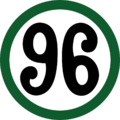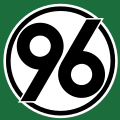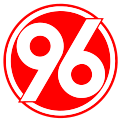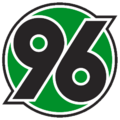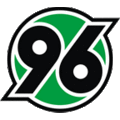Hannover 96 facts for kids
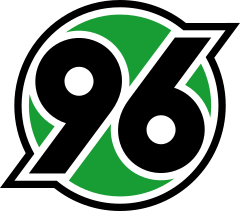 |
||||
| Full name | Hannoverscher Sportverein von 1896 e.V. | |||
|---|---|---|---|---|
| Nickname(s) | Die Roten (The Reds) | |||
| Short name | 96 | |||
| Founded | 12 April 1896 | |||
| Ground | Niedersachsenstadion | |||
| Capacity | 49,000 | |||
| President | Martin Kind | |||
| Head coach | Christian Titz | |||
| League | 2. Bundesliga | |||
| 2020–21 | 2. Bundesliga, 13th of 18 | |||
|
||||
Hannover 96 is a professional sports club from Hanover, Germany. It's famous for its men's football team, which plays in the 2. Bundesliga. This is the second-highest football league in Germany. The club has also spent 30 seasons in the top league, the Bundesliga.
Hannover 96 was started on April 12, 1896. It's a big club with over 22,000 members, making it the largest in its region, Lower Saxony.
The team has won the German football championship twice, in 1938 and 1954. They also won the DFB-Pokal (German Cup) in 1992. This was special because they were the first team from the second division to win it! Hannover 96 has also won the 2. Bundesliga title three times. They have reached the quarter-finals in European competitions twice, in 1992–93 and 2011–12.
Since 1959, Hannover 96 has played at the Niedersachsenstadion, which can hold 49,000 fans. This stadium was used for the 1974 and 2006 FIFA World Cups, and UEFA Euro 1988. The club has many loyal fans and a big rivalry with Eintracht Braunschweig.
Contents
Club History
How Hannover 96 Started
The club began on April 12, 1896, as Hannoverscher Fußball-Club 1896. At first, the members were more interested in athletics and rugby. Football became their main sport in 1899.
In 1913, the club joined with another team called Ballverein 1898 Hannovera. This created the new club, Hannoverscher Sportverein 1896. The original club's colors were black, white, and green, but they played in blue. The other team played in red. When they merged, they kept black, white, and green as the official club colors. However, they decided to play their games in red uniforms. This is why the team is nicknamed Die Roten, which means "The Reds"!
Early Success and World War II
Hannover 96 often played in national championship games in the early 1900s. They had a strong rivalry with Eintracht Braunschweig even back then.
In 1938, Hannover 96 won its first national championship. This was a big surprise because they beat Schalke 04, who were the best team in Germany at the time. The final game was a thrilling rematch that Hannover won 4–3 after an earlier 3–3 draw.
After World War II
After World War II, the club was restarted in 1945 and got its traditional name back in 1946. They started playing in the top league, Oberliga Nord, in 1947.
In 1954, Hannover 96 won another national championship, beating 1. FC Kaiserslautern 5–1. Later that year, five players from the Kaiserslautern team helped Germany win its first World Cup.
In 1963, Germany started a new professional football league called the Bundesliga. Hannover 96 joined the Bundesliga in 1964. They were very popular, setting a league record for attendance in their first year with an average of 46,000 fans per game. The club played in the top league for ten years before moving down to the second division.
Recent Years
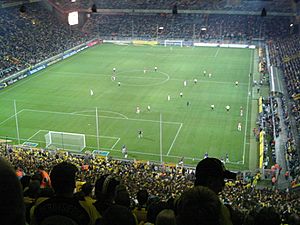
In 1992, Hannover 96 won the DFB-Pokal (German Cup). This was a huge achievement because they were a second-division team. They beat several top Bundesliga teams on their way to winning the cup. This win also helped the club with its money problems.
After a short time in the third division, Hannover 96 returned to the second division in 1998. They then made it back to the Bundesliga in 2002, having a record-breaking season with 75 points. Since then, the club has mostly stayed in the top league, often finishing in the middle of the table.
In the 2010–11 season, Hannover 96 finished fourth. This meant they qualified for a European competition, the UEFA Europa League, for the first time in 19 years! They did well in the 2011–12 UEFA Europa League, reaching the quarter-finals.
In the 2015–16 season, Hannover 96 finished last in the Bundesliga and went down to the second division. However, they quickly bounced back. In the 2016–17 season, with a new manager, they won seven of their last eleven games. This helped them finish second and return to the top league.
In 2017, during a pre-season game in England, some fans caused issues, leading to the game being stopped early.
Club Crests
Remembering Robert Enke

On November 10, 2009, the team's main goalkeeper, Robert Enke, passed away at age 32. His wife later shared that he had been dealing with depression for several years. He had also struggled with the loss of his young daughter in 2006.
When the news came out, many fans gathered at Hannover 96's stadium to leave flowers and light candles. Other football clubs and national teams also held moments of silence to honor him. The German national team even canceled a friendly match out of respect.
On November 15, 2009, nearly 40,000 people came to the stadium for his memorial service. His teammates carried his coffin, which was covered in white roses. He was buried next to his daughter. As a special tribute, Hannover 96 players wore the number one in a circle on their jerseys for the rest of the 2009–10 season.
Stadium
Hannover 96 plays its home games at the Heinz-von-Heiden-Arena. It was built in 1954 and can hold 49,000 fans. The stadium's name has changed a few times because of sponsors. It was called "AWD-Arena" before 2013, then "HDI-Arena," and now "Heinz-von-Heiden-Arena." This stadium has hosted important matches, including games in the 1974 and 2006 World Cups, and UEFA Euro 1988.
European Competitions
Hannover 96 has played in European club competitions. Here are some of their results:
| Season | Round | Club | Home | Away | Aggregate |
|---|---|---|---|---|---|
| 1992–93 European Cup Winners' Cup | R1 | 2–1 | 1–3 | 3–4 | |
| 2011–12 UEFA Europa League | Play-off | 2–1 | 1–1 | 3–2 | |
| Group | 0–0 | 0–2 | 0–2 | ||
| 2–2 | 2–1 | 4–3 | |||
| 3–1 | 2–1 | 5–2 | |||
| Round of 32 | 2–1 | 1–0 | 3–1 | ||
| Round of 16 | 4–0 | 2–2 | 6–2 | ||
| Quarter-finals | 1–2 | 1–2 | 2–4 | ||
| 2012–13 UEFA Europa League | Q3 | 2–0 | 3–0 | 5–0 | |
| Play-off | 5–1 | 5–3 | 10–4 | ||
| Group | 0–0 | 2–2 | 2–2 | ||
| 2–1 | 2–2 | 4–3 | |||
| 3–2 | 2–1 | 5–3 | |||
| Round of 32 | 1–1 | 1–3 | 2–4 |
Club Achievements
Hannover 96 has won several important titles:
- German Championship
- Champions: 1938, 1954
- DFB-Pokal
- Winners: 1991–92
- 2. Bundesliga
- Champions: 1975, 1986–87, 2001–02
Regional Titles
- Südkreisliga
- Champions: 1921, 1927, 1928, 1930
- Gauliga Niedersachsen
- Champions: 1935, 1938
- Oberliga Nord
- Champions: 1954
- Regionalliga Nord (Third Tier)
- Champions: 1997, 1998
- Lower Saxony Cup (Third to Fifth Tiers)
- Winners: 1982, 1998, 1999
Youth Team Achievements
- German Under 17 Championship
- Runners-up: 1994, 1995
- Under 19 Bundesliga North/Northeast
- Champions: 2004
Current Players
|
|
Players on Loan
|
Club Staff
Hannover 96 Amateurs (II)
Hannover 96 also has a successful amateur team, sometimes called the second team. This team has won the German amateur championship three times (1960, 1964, 1965). They have also played in the German Cup tournament.
Amateur Team Achievements
- Amateurliga Niedersachsen-West
- Champions: 1960
- Amateurliga Niedersachsen-Ost
- Champions: 1964
- Amateurliga Niedersachsen
- Champions: 1965, 1966, 1967
- German amateur championship
- Champions: 1960, 1964, 1965
- Lower Saxony Cup
- Winners: 1982
See also
 In Spanish: Hannover 96 para niños
In Spanish: Hannover 96 para niños
 | Selma Burke |
 | Pauline Powell Burns |
 | Frederick J. Brown |
 | Robert Blackburn |


